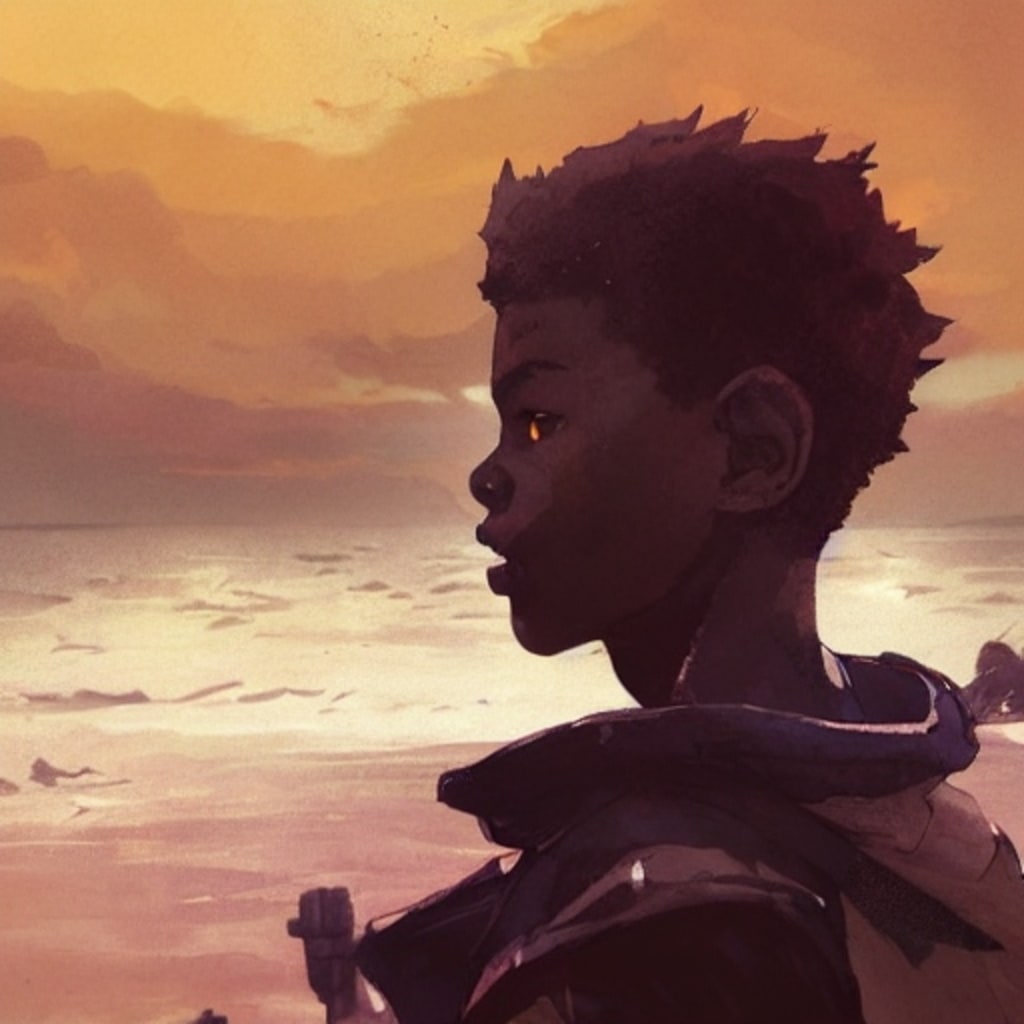
Synopsis: A young indigenous Liberian boy's life changes when he gets adopted by a wealthy Americo-Liberian family in 1970s Liberia. Amidst cultural tensions, our protagonist has to figure out what it means to be a Liberian and more importantly, what it means to be him. When the cultural tensions in Liberia come to a boiling point, our protagonist finds himself seeking refuge in the United States and having to relearn who he is and what it means to be a Liberian on American soil.
* Author's Note: This story will use some instances of Liberian English or Liberian Kreyol. *
Chapter 1: "New Beginning"
Monrovia, Liberia - 1972
I stared down at the letters that were etched in the dirt in front of me. The longer I stared, the more peculiar they looked. A bead of sweat rolled down my face and landed on the C, splashing quietly and smearing the already crooked letter. Using my finger, I smoothed the dirt out where my perspiration had ruined it and picked up a stick to re-trace the blurred line more carefully this time.
JACOB TOLBERT.
I had written the words a handful of times by this point, but they still looked just as unfamiliar to me as the first time I had written them. But it was my name now. The name given to me by the Congo people who had adopted me.
The Congos - as they are called colloquially - are Americo-Liberians, descendants of free Black Americans who had settled in Liberia in the 1800s.
I was not a Congo. I was what they referred to as "Country," having been born to one of the sixteen indigenous tribes of Liberia. My entire family was from the Vai tribe and had lived in Grand Cape Mount County, which bordered Sierra Leone, our neighbors to the northwest, for generations. But at twelve years old, I was squatting in the dirt in Monrovia, the capitol of Liberia, coming to terms with my new name and new life.
To my adoptive parents, the name Jacob Tolbert was more civilized than Boakai Siaka Fahnbulleh, which was the name my mother gave me at birth. I couldn't be the son of Congo people with a name like that. So I was christened Jacob Tolbert almost immediately after they took me in.
My mother was still just a girl when she had me, barely past puberty, and died during childbirth. My father, so I was told, was several years older and wanted nothing to do with me or my mother. So he pretended the two of them had never laid eyes on each other. As far as I know, he left the village soon after my mother got pregnant and went to Monrovia. I sometimes imagined a Country man with my face walking around Monrovia, stealing money from Congo people and wondered if we would ever cross paths.
Being that my parents were not in my life, my maternal grandmother had taken on the role of raising me. This meant three things were drilled into my head from an early age: that my grandmother and I were not equals, that money did not grow on trees, and that in all things, Allah would provide. The first two things, I never doubted. But when I sat on the dirt floor of my grandmother's living room in front of a kerosene lamp, watching her head be shaved by our neighbor after the announcement that she had breast cancer, I began to doubt that Allah was going to look out for me. About a month later, my grandmother held out her hand that had once made grown men cry and I felt every frail bone beneath her papery skin. That was when she told me that she was too sick to care for me any longer. And she had decided - without consulting me - that my best chance of survival was to be adopted by a rich Congo family that she had already picked out: the Tolberts.
After my initial sadness about my grandmother's condition had dulled into an unwilling acceptance, I felt a little excited about the arrangement. When I heard the name Tolbert, I pictured myself living in the Executive Mansion - the Liberian version of America's White House - where President William Tolbert and his family lived. I couldn't hide my disappointment when Othello, the Tolberts' driver, parked the dark blue Pontiac in the lumpy patch of dirt in front of my grandmother's house shortly after. I asked him right then and there if he was taking me to President Tolbert and a deep laugh erupted out of him.
"I'm taking you to his long lost cousin," he said, wiping tears from his eyes.
I chuckled thinking about that moment as droplets began sprinkling onto my name in the dirt again, but this time it wasn't my sweat. The rain quickly picked up, beating down on the dirt and washing away my name. My white dress shirt clung to my skin and my undershirt reflected through as I was blinded by the rain. It was the beginning of the rainy season in Liberia - early May - but I was lucky enough to have caught a few dry minutes before the rain started. I quickly pulled my black leather dress shoes off and ran through the street back towards my new parents' house, shoes in hand.
The rain pelted against my skin and I cursed myself internally for not carrying an umbrella. By the time I reached the front porch, my white socks were stained brown with mud along with the bottom of my pant legs. I quickly pulled the socks off and threw them in the shrub next to the porch, where they disappeared. I left my shoes by the door under the awning where they would eventually dry out and rolled my pant legs up. With a large breath, I stepped inside the house.
The smell of wealth greeted me - a mixture of air conditioning, marble, and scented candles. A significant contrast from my previous home that smelled of dry fish, mud, and zinc. Looking around the grand foyer and seeing no one, I quickly and carefully tiptoed up the staircase into my bedroom and closed the door behind me. I stripped my clothes quickly, stashing them in the bottom of my laundry hamper. I would have to bribe the houseboy, Togar, not to gossip to Ma Ruth about the state of my clothes when he went to wash them.
Grabbing some fresh clothes and my bathrobe, I stole into the bathroom where I washed away my guilt. As soon as I turned the shower off, there was a knock on the door.
"Yes?" I called, trying to sound as innocent as possible.
"Dinner's ready." It was Togar.
"I'm coming," I said back and waited until I could no longer hear his footsteps to put my clothes on and exit the bathroom.
When I walked down into the large dining room, my Congo parents and their son, who was a couple of years older than me and the same age as Togar, were already seated at the table. I took my seat between the son, Daniel, and the Old Ma (the woman of the house), Ma Ruth. No one mentioned my tardiness and I thanked the Lord internally. Papa Joseph, my adoptive father, sat at the head of the table with Ma Ruth seated on his right and Daniel on his left. I sat at the other end of the table silently.
“Daniel, say grace,” Ma Ruth said once I was seated.
“Lord, thank you for the food and for the cook who prepared the food. Let it nourish our bodies in Jesus name. Amen.”
“Amen,” I repeated quietly, but then quickly and silently said a prayer of my own before touching any food, asking for Allah's blessings and forgiveness for the amen.
The table was covered with food. A big bowl of white rice, cassava leaves and meat cooked in a stew of palm oil, fried plantains, and a tray of cornbread.
I dove into the food, not realizing how hungry I had been. The sound of my silverware scraped and tapped against my plate and practically rang off the walls of the dining room. I was nearly done with my first helping of cassava leaf stew and rice when I felt eyes burning into me. I looked up from my plate and found all three pairs of eyes from the Tolberts watching me with disapproval. Daniel smirked at me as I wiped my mouth with a napkin and looked down at my plate. No one said anything but I made sure to slow down and didn't look up again for the rest of the meal.
Papa Joseph was the first to rise from the table, excusing himself and leaving his dishes where he had sat. Next Ma Ruth did the same and finally Daniel. Before he exited the dining room, he turned to me.
"Tomorrow is Sunday," he stated matter-of-factly.
"Yeah…" I answered, unsure of where he was going with that.
He rolled his eyes. "We're going to church. You need to find what you're gonna wear. Mama's not gonna drag you behind us looking like 'Who Shot John.'" And with that, he left the room.
Church, I thought. I had never been to church but I thought about the clothes I had brought from my grandmother's house. Togar was clearing off the table.
"What you wearing?" he asked me.
"Well…" I started, "I got this white kaftan -"
Togar immediately shook his head. "The Old Ma 'them are Baptists. You need a suit."
"I don't have a suit."
Togar shook his head and said something under his breath in Bassa, his tribal language.
"I have one," he said. "You can borrow it but it might be a little big."
I was taken aback. I had only been in the Tolbert household for a week and Togar had never extended any kindness to me in that time. In fact, he usually went out of his way to get me in trouble with Ma Ruth by telling her how I had dirtied my clothes or when I got into a fight with the Congo boy down the road who called me "Country" to my face (In Liberia, it was okay for Country people to call other Country people "Country" but in the mouth of a Congo person, it was practically a slur).
"What you being nice to me for?" I asked, instead of just thanking him like a normal person.
Togar continued clearing the plates off the table and as he reached for mine, I grabbed it for him, stacking my cup and silverware on top and following him to the kitchen sink. Finally, as he began washing the dishes, he responded to me.
"Because you're a Tolbert now."
I watched in silence as Togar washed my dishes. I was a Tolbert now. And by the way he said it, me - a Country boy - being a Tolbert, wasn't just a source of obligation for Togar, but one of jealousy too. Togar was a Country boy like me but he was not a Tolbert. His parents had sent him to the Tolberts as a servant, just like Othello, who was also Vai, and Flomo, the Tolberts' groundskeeper who was from the Kpelle tribe.
That night when I went to bed, I listened to the sounds of the city outside my window and tried to ignore how my body sunk into my too soft bed. And as I turned over, I couldn't help but worry about church the next morning and wonder if Togar's bed in the servant boys' house was also too soft.
My eyes had barely shut when I was being shaken awake. I groaned and rolled back over, thinking it was Togar. A hot slap came across my face and made my ears ring.
That was when I heard Ma Ruth's voice.
"Wake up, you boy. The Lord is waiting."
__________________________
Follow me on Instagram to see more interesting content and if you liked this post, make sure to hit the follow button.
Thanks for reading!
-Chanté
About the Creator
C.R. Hughes
I write things sometimes. Tips are always appreciated.
Reader insights
Outstanding
Excellent work. Looking forward to reading more!
Top insights
Excellent storytelling
Original narrative & well developed characters
Eye opening
Niche topic & fresh perspectives






Comments (2)
I really enjoyed this, you set a really good foundation for the rest of the story already.
Beautiful cadence & cultural insights! 💙👏💙